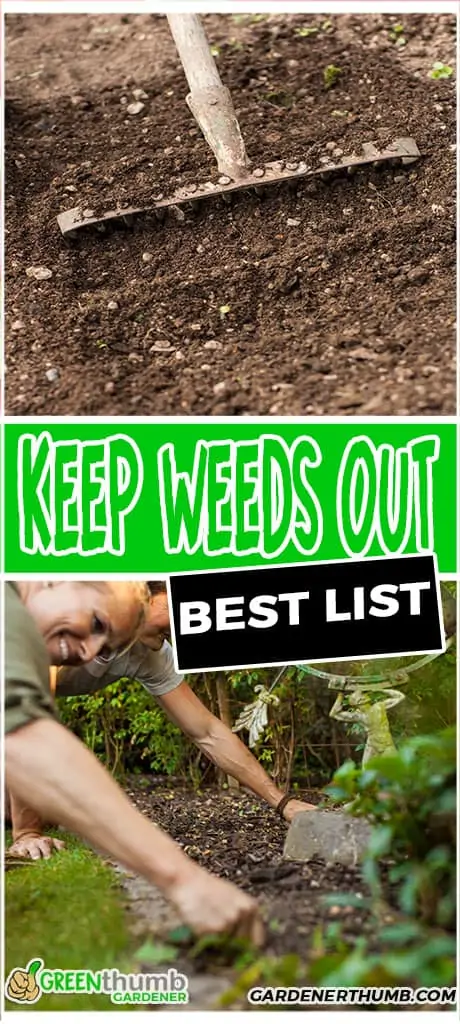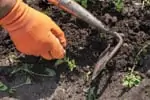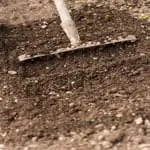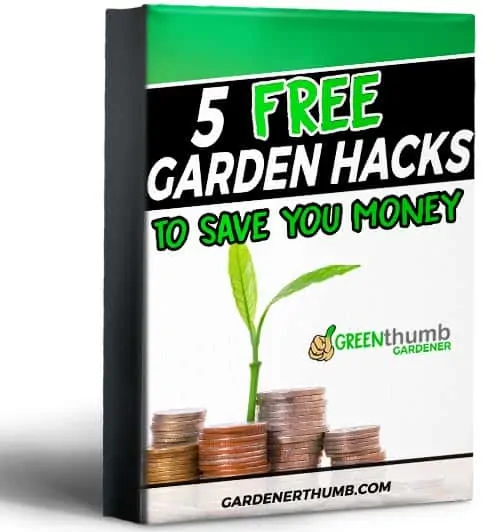10 Best Ways To Keep Weeds Out Of Garden [Organic]
Last updated: 03/05/21
You are working in your precious garden and what do you spot? Definitely not a garden gnome but instead it is a pesky weed that is robbing your beautiful plants of nutrients & water.
You want to know the best ways to keep weeds out of your garden. Especially the persistent ones that just won’t go away.
We give you the ten best ways to keep those pesky weeds out.
Green thumb Gardener occasionally links to product and/or services offered by vendors to assist you with all your gardening needs. Some of these may be affiliate links, meaning we earn a small commission if items are purchased.
Want to Download a Garden Hack Guide for FREE
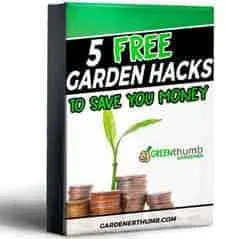
Enter your email below and we will send you a guide to help you SAVE money in your garden.
10 Ways To Weeds Over Time Out of Your Garden Bed
Every seasoned or experienced gardener would agree that weeds are a nuisance and a big deterrence in plants’ productivity.
However, there are excellent vegetable garden weed techniques or practices you can utilize in curbing these menaces.
1.| Mulching
For those of you new to gardening, you may think of horse poop when you hear the word “Mulch”.
Using mulch should be part of your organic weed control plan.
Mulching is the process of adding a thick layer of material. This layer of mulch could be harwood bark mulch, shredded leaves, wood chips, or other sources of mulch.
- Retaining soil surface moisture & soil structure
- Providing plant nutrients & promotes healthy soil over time
- Reduces evaporation to keep soil microorganisms moist
- Improving the visual appeal of the soil especially when using prettier mulch like dried up tree bark
- Primary Organic Weed Barrier that leads to healthier soil
Organic mulches like hardwood bark mulch or straw aren’t the only materials that can be used to mulch. Although most combination of mulches are usually organic, there are some inorganic mulching materials such as plastic.
Mulching helps to keep most type of weeds out of the garden by blocking sunlight from reaching these annual weeds thereby suppressing their growth.
While mulch is one of the best ways to keep weeds out of the garden both rationally and aesthetically, using too little of it and you’ll see your efforts wasted because the weed would find a way to sprout.
2.| Cover Crops
You may have heard in forums dedicated to gardening that you should never keep your garden bare.
If you’ve been wondering how you can keep the soil of your garden useful all year round, then cover cropping is the way to go.
Cover cropping apart from the obvious benefits of acting as a barrier between your soil and the elements such as heavy sunlight or erosion. It is also one of the best ways to keep perennial weeds out of your garden.
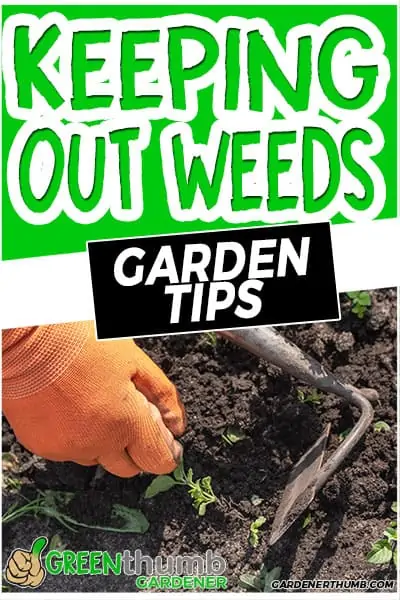
Here’s how it is a core of weed prevention:
- Planting cover crops lowers the chances of weed growth during the year by covering the soil and seeds above ground.
- When you plant your cover crops with your other vegetables, they suffocate and inhibit weed growth on the soil
Another thing worth knowing about cover crops is that after they’ve served their purpose, they die off, decompose and add even more nourishment to the soil further improving the quality of your vegetables.
Some examples of cover crops are crimson clover and cereal rye.
3.| Companion Planting
Everyone needs a friend and your vegetables do too.
Companion planting is densely planting so that there’ll be no space or gaps between plants as even soil between the major vegetables would be planted upon.
Companion planting disrupts weed growth and over time, they start to compete for space and all you need to do to get rid of them is simply to pluck them out of the garden soil before they get to become a major issue.
Some examples of companion planting are the planting of asparagus with companion plants such as basil, parsley, and tomatoes.
Some people even believe that apart from the aforementioned of protecting your garden plants by weed control, some companion plants also have the ability to provide holistic health benefits to your wonderful vegetables.
Companion planting is also effective in getting rid of pests
4.| Always Inspect
Before introducing transplants or any new plant to your garden, you should always check and inspect the soil of the plant.
As is commonly known, some weeds lie dormant within the soil and just need a few nutrients to germinate and cause a nuisance to the rest of your vegetable garden.
Unwanted plants like goutweed have been known to hide within the soil of transplanted plants, vegetables, and even flowers.
Especially if your transplants are gotten from an outsider source, breaking up the root to scout for the presence of weeds would be beneficial.
5.| Salt
Sometimes the best solution to gardening problems can be found right in your kitchen. Salt doesn’t just add taste to our meals, it’s also a known and effective weed killer.
Although a common DIY trick to get rid of weeds, salt isn’t as effective on its own.
Here’s how you use salt to kill weeds:
- You’ll use a ratio of three-part salt to one part water.
- Stir the solution until the salt particles have completely dissolved in the water
- Avoid pouring the water haphazardly, instead, make sure to target the problem weeds by pouring the solution on to their roots
- Ensure not to get any of the solutions on to your precious plants as this might cause them to be affected as well
This salt technique as a way to get rid of weeds works by altering the water balance of the plant when it’s absorbed by the plant’s root system.
Over time, the weeds begin to wilt until they eventually die.
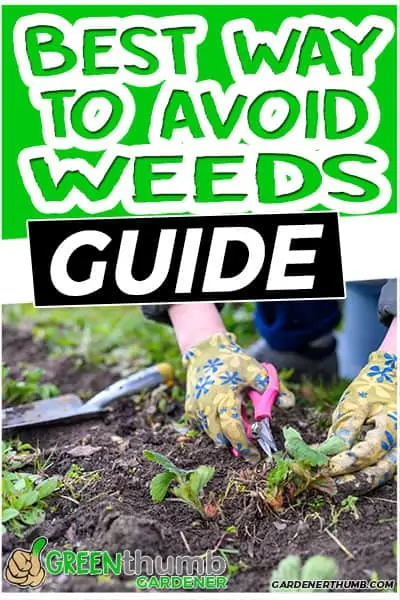
6.| Vinegar
Vinegar isn’t just for washing vegetables these days. It is also an effective organice weed control for getting rid of weeds in your garden.
The only problem is that the good old vinegar we get at stores (white vinegar) is not potent enough to kill weeds in a single-use because it’s heavily diluted.
So you can opt to use vinegar as it is. You put some in a spritz/spray bottle and spray directly at the weeds or the patch of ground the weeds are sprouting from.
You can add some extra power to your vinegar weed be gone spray. Some ingredients you can add to your vinegar spray are; a cup of salt and a tablespoon of liquid dishwashing soap to a gallon of white vinegar.
This would increase the killing power of your vinegar spray and kill off the weeds almost instantaneously.
However, just like with the salt mix, you should apply with caution because excessive use of this mixture can cause a pH imbalance to the soil also affecting your plants in the process.
To help the plant stay alive and bloom, make sure that you grow it in a container or pot with good drainage holes since Fuchsia is vulnerable to root rots.
7.| Boiling Water
Boil some hot water and take it outside and pour it on the ground where the weeds are.
Hot water like using fire burns off these weeds and when angled properly, the hot water needs not to get to your vegetable plant instead it lands on and only affects the unwanted plants in your garden.
Although it’s not the safest method of taking care of unwanted plants as it could cause bodily harm to you and your precious vegetables, it is still much more time-efficient than plucking out the weeds one by one.
If you do decide to get rid of weeds by burning with hot water, then do it as early as possible when the weeds are still young.
8.| Off With Their Heads
Sometimes the best thing to do is to take a note from the queen of hearts and chop off their heads.
This technique although might be time-consuming, is not as invasive as the others mentioned above. If done correctly, none of your plants would ever be at risk.
Cutting off the heads of weeds before they can seed doesn’t kill the weeds. What it does manage to do is to slow down the growth and stop reseeding.
This would give your plants enough time to grow and be ready for harvesting without competing with the weeds for soil nutrients and sunlight.
Cutting the weeds before the weed seeds can develop would help you in taking care of one of the biggest weed threats which is the cross spreading of these weeds making the problem even greater.
You can easily practice this technique using; a rotary lawnmower with a bag to collect the debris or and although it might take a minute or two, a pair of pruning shears also helps and you can cut off the weed heads before the weed seed develops.
9.| Weed Them Out
There are times where you need to get on your knees and get your hands dirty, and pulling out the unwanted plants one by one.
This is almost a final way of getting rid of weeds especially when you yank them out when they’re young
When you take the weed out at a young age, it makes the process of weeding extremely easy because, at that point, the weed is yet to form a complex root system or structure.
That’s why it’s important to spend a lot of time in your garden or at least as often as possible to avoid instead of making a chore out of inspecting your garden and uproot any unwanted plant immediately you notice it.
10.| Stop Tilling or Disturbing The Soil
In some cases, the best you can do is let sleeping dogs lie or in this case, let sleeping weeds lie and leave them be.
There’s a possibility that when you consistently disturb the soil, hidden weeds or dormant weed seeds that wouldn’t have otherwise germinated due to lack of sunlight would get to the surface causing more harm than good.
So the best thing to do would be to leave them undisturbed and instead cut off the developing weed seed to avoid further cross germination.
That aside it’s what knowing that no vegetation is a useless weed or not. Some vegetables often referred to as weed serve medicinal purposes and some can even be eaten as food.
Saving these weeds to later use for another purpose e.g medical purposes won’t be such a terrible idea.
Final Thoughts
In summary, it’s important to understand that the life of a plant in a container is much different from the one in the ground.
Always remember that while the container can provide excellent drainage, the plants are dependent on you for water, nutrients and positioning them under direct sunlight or partial shade.

